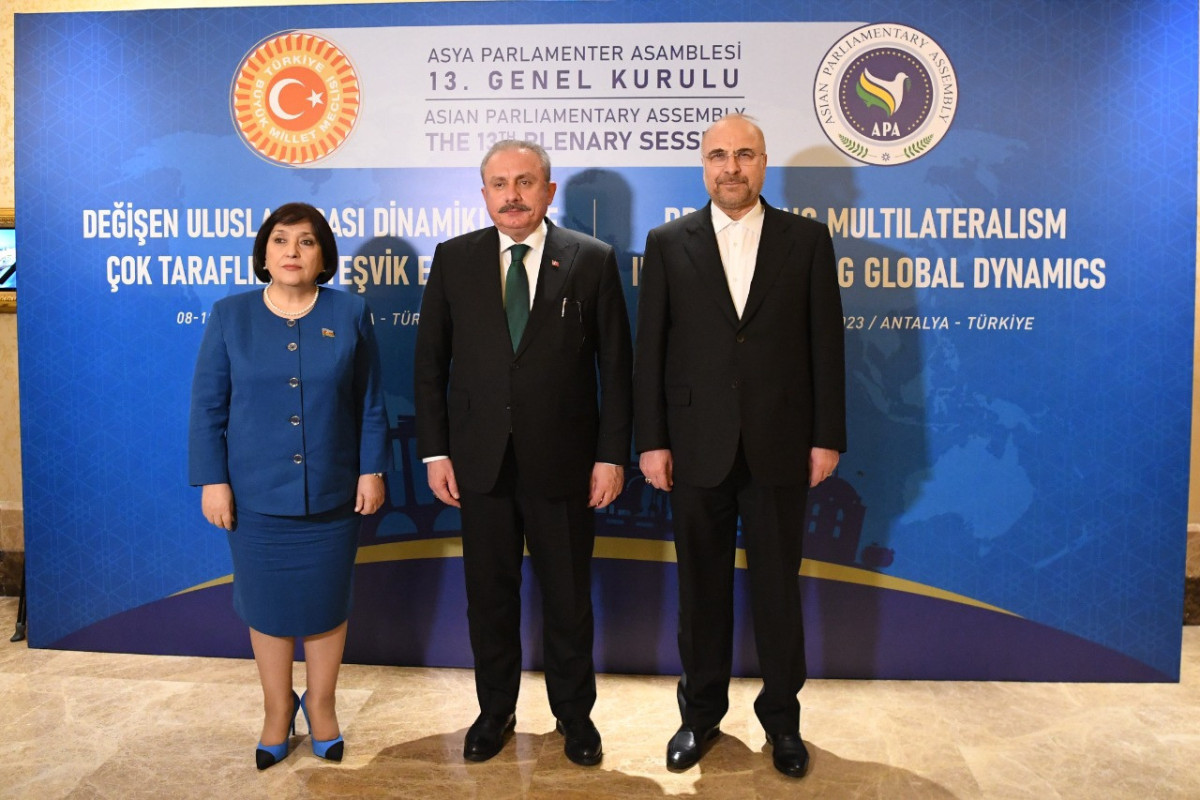Iranian Parliament Speaker Mohammad Baqer Qalibaf has said that Tehran and Baku have "resolved recent misunderstandings".
"There were misunderstandings recently with the Republic of Azerbaijan but these issues were resolved," Qalibaf told reporters in Tehran on January 10, after a meeting with his Azerbaijani counterpart Sahiba Qafarova in Türkiye on the sidelines of the Asian Parliamentary Assembly (APA).
"We can have good relations with each other at the regional and global level," Qalibaf said.
In his meeting with Qafarova on the sidelines of the 13th Plenary Session of the APA on January 9, Qalibaf reiterated Iran's opposition to any changes to borders in the region and noted that Tehran is ready to expand trade and transit with Azerbaijan.
The Iranian speaker told his Azerbaijani counterpart that parliamentary discussions can play a great role in developing relations between the two neighbors.
Qafarova, for her part, said that there is plenty of scope for expanding cooperation between Tehran and Baku. She also said Azerbaijan wants and supports peace and stability in the region.
The meeting highlighted the need to refrain from behaviour that could harm stability and cause tension in the region and take steps to promote regional cooperation.
In addition, the meeting identified new opportunities emerging in the region after Azerbaijan liberated its lands from a 30-year-long Armenian occupation, and stressed the importance of signing a peace agreement between Azerbaijan and Armenia to ensure permanent stability and security in the region.
On January 9, Iranian Foreign Ministry Spokesman Nasser Kanani denied tensions with Azerbaijan, saying that the two countries are "compelled" to cooperate on various issues.
"I do not confirm ice to be in place. Despite some misunderstandings, there are established relations and the two countries are compelled to test new grounds for cooperation, as they are neighbours and have mutual borders, history, interests, and political inclinations," Kanani said, according to the state-run IRNA.
He added that if there are any misunderstandings, they should be resolved through diplomacy. Iran will continue to move within the same frameworks it used to move in the past.
In a phone conversation last December, Iran's Foreign Minister Hossein Amir-Abdollahian told his Azerbaijani counterpart Jeyhun Bayramov that Tehran is "opposed to foreign countries' presence in the region".
"Regional problems can well be resolved by the regional countries with the adoption of positive approaches," Amir-Abdollahian said, and expressed hope for expanding political and economic cooperation between Tehran and Baku in 2023, as well as cooperation on transit and transportation.
The Iranian foreign minister also talked about "creating working groups on the media activities of the two sides", in addition to water shortages and pollution in the Araz River, which is a border river between Iran and Azerbaijan.
For his turn, Bayramov expressed his government's willingness to expand economic cooperation with Iran and hold a meeting for the countries' joint economic commission in early 2023.
At a news conference on December 27, devoted to the results of 2022, the Azerbaijani foreign minister said that there has been certain tension in Azerbaijan-Iran relations recently, but the situation should not be "overdramatised".
"I have had many meetings, telephone conversations and contacts with my Iranian counterpart in this regard, he has also always shared the opinion that we should make more efforts to improve our relations and develop relations in a more positive way. The Azerbaijani Republic is always ready to reciprocate. Our main position is that good-neighbourly and friendly relations should be developed based on the principles of mutual respect for each other's interests and non-interference in each other's affairs," Bayramov said.
Relations between Tehran and Baku have been strained recently with increasing anti-Azerbaijani rhetoric surfacing in Iranian media and Tehran seeing Azerbaijani-Israeli cooperation as a threat to its national security. Azerbaijan appointed its first ambassador to Israel on December 29 amid tensions between Azerbaijan and Iran. Azerbaijan had no embassy in Israel although the two countries had diplomatic relations for 30 years and Israel already had its embassy in Baku.
Tehran also fears that the proposed "Zangazur corridor" – a transit route linking Azerbaijan's mainland with its exclave Nakhchivan – will sever Iran's land connection with Armenia. The establishment of transport links between mainland Azerbaijan and Nakhchivan was agreed upon as part of the Russian-brokered peace deal that ended the Second Karabakh War in 2020.







 Russian Foreign Minister Sergei Lavrov has reasserted that Moscow has no intentions to stop the fighting in Ukraine, even if peace talks commence.
Russian Foreign Minister Sergei Lavrov has reasserted that Moscow has no intentions to stop the fighting in Ukraine, even if peace talks commence.
 Iran has refuted reports of alleged damage to Shimon Peres Negev Nuclear Research Centre located southeast of Dimona, Israel, during the recent air...
Iran has refuted reports of alleged damage to Shimon Peres Negev Nuclear Research Centre located southeast of Dimona, Israel, during the recent air...
 Iran and Pakistan have signed eight cooperation documents in various fields, and agreed to strengthen ties to fight terrorism in the region.
Iran and Pakistan have signed eight cooperation documents in various fields, and agreed to strengthen ties to fight terrorism in the region.



